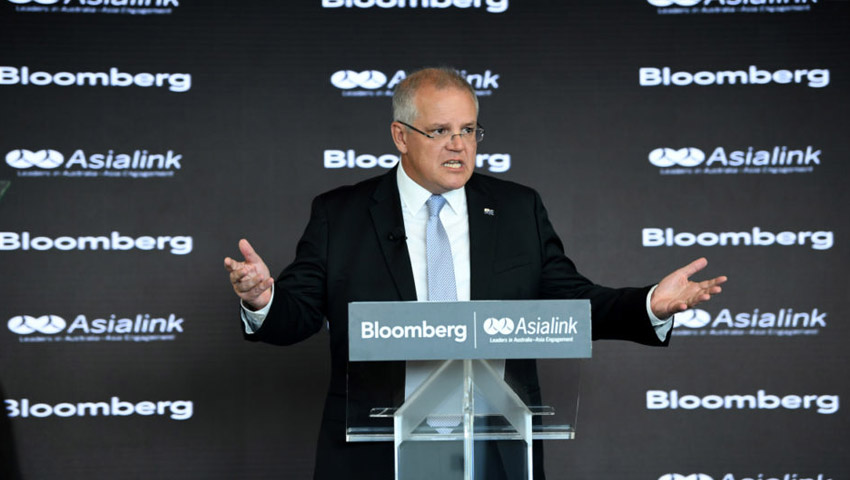Prime Minister Scott Morrison has used the latest prelude to the G20 to help outline Australia’s enduring commitment to the Indo-Pacific and charting the ‘middle ground’ of the continuing tensions between the US and China.
"The Indo-Pacific is where we live. It is where we have our greatest influence and can make the most meaningful impact and contribution. It is the region that will continue to shape our prosperity, security and destiny. It is the region where, together with our allies, and especially the United States, our people made great sacrifices when our peace was threatened," Prime Minister Scott Morrison said, setting the scene for the Australia's contribution to the G20 forum in Osaka, Japan.
The Prime Minister sought to highlight the Australia's growing acceptance of its position in the Indo-Pacific following what has long been a tough relationship with the ‘tyranny of distance’.
"It [Indo-Pacific] is the destination for more than three-quarters of our two-way trade. It embraces our Pacific family with whom we have special relationships and duties, our close neighbours, our major trading partners, our alliance partners and the world’s fastest growing economies. Where else would Australia want to be?" the Prime Minister posited.
The rise of Indo-Pacific Asia means the ‘tyranny of distance’ has been replaced by a ‘predicament of proximity’. China, India, Indonesia, Thailand, Japan and several other regional nations are reshaping the economic and strategic paradigms with an unprecedented period of economic, political and arms build-up, competing interests and rising animosity towards the post-World War II order Australia is a pivotal part of in the region.
Setting the scene - Australia's Indo-Pacific Relationship
The growing bilateral economic and emerging strategic relationships between Australia and the region also figured strongly for the Prime Minister in his address to the Asialink Bloomberg Address – with a focus on the relationships with Japan, China, India and the growing importance of Australia's economic relationships with ASEAN nations.
"Our post-war trading relationship with Japan, marked by our commerce agreement secured in 1957, saw Japan become our largest trading partner until just over a decade ago. The relationship is now broader and deeper than ever before, This weekend Prime Minister Abe will preside over the G20 as a great friend of Australia and one of the region’s most highly respected statesmen," the Prime Minister stated.
"We share a comprehensive strategic partnership and free trade agreement with the People’s Republic of China, with a broad and deep relationship underpinned by people-to-people ties; evidenced by the fact we are home to 1.2 million ethnic Chinese and are host to 1.4 million Chinese visitors and 205,000 Chinese students each year.
"The growth in India’s economic and strategic heft is increasingly felt beyond the Indian Ocean, creating new opportunities for Australia based on our shared values and outlook. India is also now the single largest source of permanent migrants to Australia.
"Our special relationship with ASEAN since its inception has plugged us into a critical network of independent and dynamic developing economies working together to create their own norms and rules for intra-regional growth, critical to the interests of all Indo-Pacific members."
Balancing prosperity with security
This rapidly evolving global environment, combined with the increasing instability of the US administration and its apparent apprehension to intervene or at least maintain the global rules-based order following the radical shift in US politics, also forces Australia to reassess the strategic calculus – embracing a radically new approach to national security strategy and policy.
The impact of the rapidly deteriorating bilateral relationship between the US and China – Australia's major strategic and economic partner respectively served as the primary focus of the Prime Minister's address.
"The world’s most important bilateral relationship – the US-China relationship – is strained. Trade tensions have escalated. The collateral damage is spreading. The balance between strategic engagement and strategic competition in the US-China relationship has shifted," he said.
The Prime Minister was quick to recognise that some of the concerns about China's rise were legitimate, saying, "China’s economic rise has not been a zero sum game. This has been especially true in Australia’s case, but also for the United States. This is why Australia has always, and will continue to, welcome China’s economic growth.
"However, the ground has now shifted. It is now evident that the US believes that the rule-based trading system – in its current form – is not capable of dealing with China’s economic structure and policy practices. Many of these concerns are legitimate. Forced technology transfer is unfair. Intellectual property theft cannot be justified. Industrial subsidies are promoting over-production. China’s rise has now reached a threshold level of economic maturity," PM Morrison said.
Nevertheless, the Prime Minister reaffirmed Australia's enduring commitment to maintaining the global order that all modern prosperity is dependent on – the US, China, Australia, none are exempt from the impact of America's post-Second World War order which figured as a key component of the Prime Minister's address.
"It is therefore important that US-China trade tensions are resolved in the broader context of their special power responsibilities, in a way that is WTO-consistent and does not undermine the interests of other parties, including Australia," he said.
"The accumulation of issues that have led to these tensions must be acknowledged, addressed and resolved at the negotiating table in a way that reinforces our open and inclusive global trading system.
"Like all of us, China and the US have a strong interest, and a special responsibility, to modernise and support the system that has delivered unprecedented growth in national wealth and living standards over the last two decades."
Get involved with the discussion and let us know your thoughts on Australia's future role and position in the Indo-Pacific and what you would like to see from Australia's political leaders in terms of partisan and bipartisan agenda setting in the comments section below, or get in touch with



